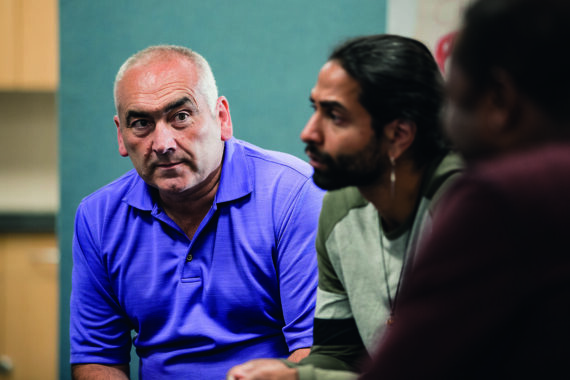People from Black and minority ethnic groups are less likely to access NHS Talking Therapies services and have longer waits when they do, a report has warned.
Analysis by the NHS Race & Health Observatory of a decade of anonymised patient data also found that compared with white British patients, those from minority ethnic backgrounds were also less likely to receive a course of treatment after assessment.
With the exception of Chinese people, those from minority ethnic groups also had worse outcomes, although this gap has narrowed in recent years, the report found.
But it concluded that poor outcomes can be tackled and even disappear when access is improved, and culturally sensitive therapy is provided.
Those from Bangladeshi, Pakistani and Black Caribbean backgrounds were among those with the worst outcomes, the report found.
Issues identified included older people being dependent upon younger relatives to interpret, and a lack of understanding of the significance of religion and belief.
For others, there was a stigma associated with mental health with feelings of shame, guilt and the urge to conceal problems due to fears of being excluded by the community.
The inequalities identified were also linked with higher symptom severity when first assessed by NHS Talking Therapies services, previously known as IAPT but rebranded earlier this year.
A Positive Practice Guide published in 2019 for services to adopt does not appear to have been consistently applied, the report found, although good examples were identified.
ICBs and those in leadership positions should use local data to understand the needs of their communities as well as identifying resources and funding to address inequalities.
Services should also ensure that all interventions are provided in a culturally sensitive way, the report recommended.
Dr Habib Naqvi, chief executive of the NHS Race and Health Observatory, said: ‘We recognise there are still critical gaps in access and outcomes when it comes to mental health support and talking therapies, across different ethnic groups.
‘There are many people from Black and minoritised ethnic communities struggling with their mental health, and yet they are less likely to be referred to talking therapies and have poorer experiences and outcomes once they are referred.
‘It’s vital that we take a serious look at the findings of this review – reflect on what has been effective in the past, and address how service provision can be more inclusive and equitable across all communities.’
Professor Steve Pilling, academic and strategic director of the National Collaborating Centre for Mental Health, said: ‘The results of this review show there is good evidence to provide people with effective mental health support, including those who are in the most underserved groups.
‘We hope it will serve as a catalyst for practical and effective change which we are confident will be supported by effective monitoring of outcomes.’
Saffron Cordery, deputy chief executive of NHS Providers, said the report highlighted worrying inequalities.
‘It is deeply concerning that poor access to talking therapies and longer waits for assessment are leading to worse outcomes and experiences for people from ethnic minority backgrounds.
‘While this research found areas of good practice and some improvements with regards to NHS talking therapies, trust leaders know much more needs to be done to tackle deep-rooted structural racism, bias and discrimination in health services which leads to poorer physical and mental health outcomes for ethnic minority groups and those living in areas of high deprivation.’
But she added there were wider issues to tackle.
‘Alongside a sustained focus on supporting local health systems to better address inequalities in access, experience and outcomes of mental healthcare, it is vital that the government takes action on the wider factors that contribute to wider societal inequalities including housing and employment.’
Pulse July survey
Take our July 2025 survey to potentially win £1.000 worth of tokens












